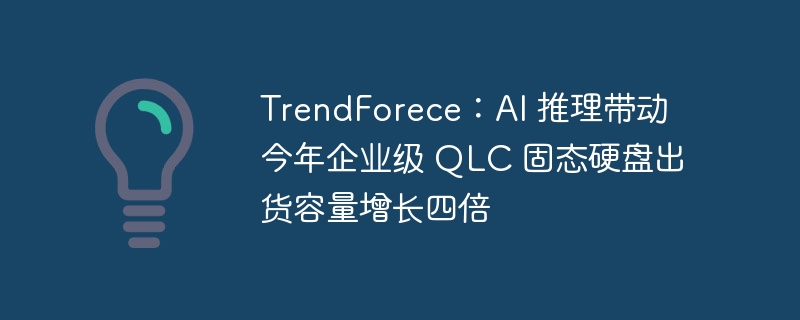

According to news from this site on April 23, TrendForce released a research report today, showing that the shipment position of enterprise-class QLC solid-state drives this year will increase by 4% due to the demand for AI inference servers. times, reaching 30EB (Note from this site: approximately 31.46 million TB). The research report points out that the demand for high performance and high reliability in traditional enterprise-level data centers is still the main market for QLC solid-state drives. However, with the development of artificial intelligence, the growing demand for storage capacity of AI inference servers will drive a surge in QLC SSD shipments. With the popularity of AI applications, including data
research reports indicate that AI inference servers mainly read storage media, and writes are not as frequent as AI training servers. Although the writing endurance of enterprise-level QLC solid-state disks is not as good as that of TLC disks, it is not inferior in reading performance and also has cost advantages.
Compared with enterprise-class mechanical hard drives, enterprise-class QLC solid-state drives have obvious advantages in speed and lower operating consumption. At the same time, enterprise-level QLC solid-state drives can already achieve a capacity of 61.44TB, which is larger than the 20~24TB common in enterprise-level mechanical hard drives.
AI, especially AI training, is a high-energy-consuming application. Large-scale AI server customers increasingly value the energy efficiency of storage products.
The energy efficiency of QLC solid-state drives is better than that of mechanical hard drives, and it requires less physical space. It has advantages in overall TCO, which promotes the adoption of QLC solid-state drives in AI inference servers.
Specifically, only Samsung and Solidigm’s enterprise-class QLC SSDs in the enterprise have passed the verification test. Therefore, both companies will benefit from this trend, especially Solidigm, which actively promotes QLC products.
Solidigm plans to expand the production of 144-layer QLC flash memory in the next six months. On the other hand, Samsung Electronics is expected to start mass production of the QLC version of the ninth-generation V-NAND flash memory in the second half of the year, but it will still be dominated by 176-layer (seventh-generation V-NAND) QLC flash memory.
The research report predicts that the tight supply of large-capacity QLC products will drive the contract price of enterprise-class solid-state drives to continue to rise in the third quarter, with an increase of about 5~10%.
The above is the detailed content of TrendForece: AI inference drives enterprise-class QLC SSD shipment capacity to quadruple this year. For more information, please follow other related articles on the PHP Chinese website!




